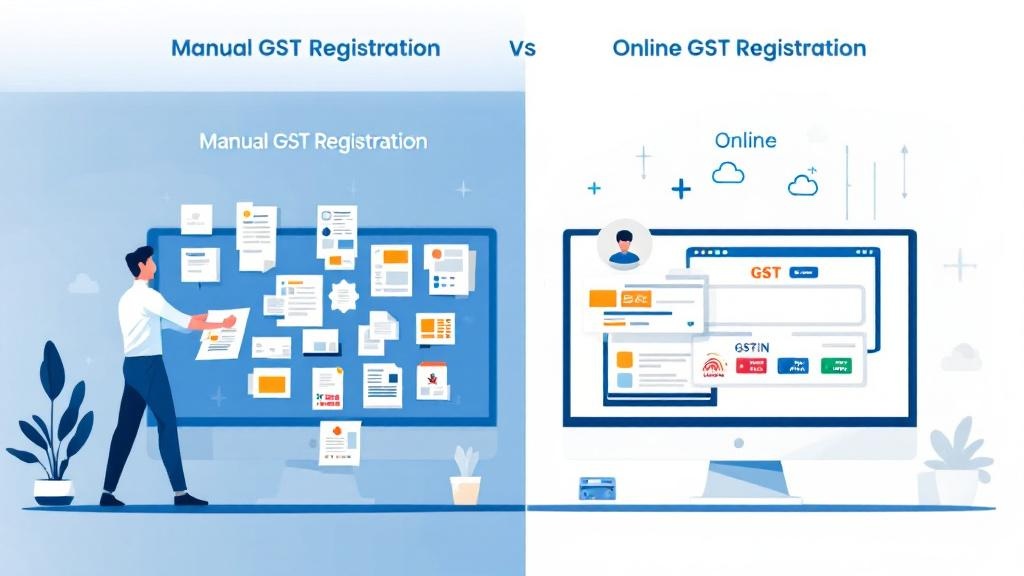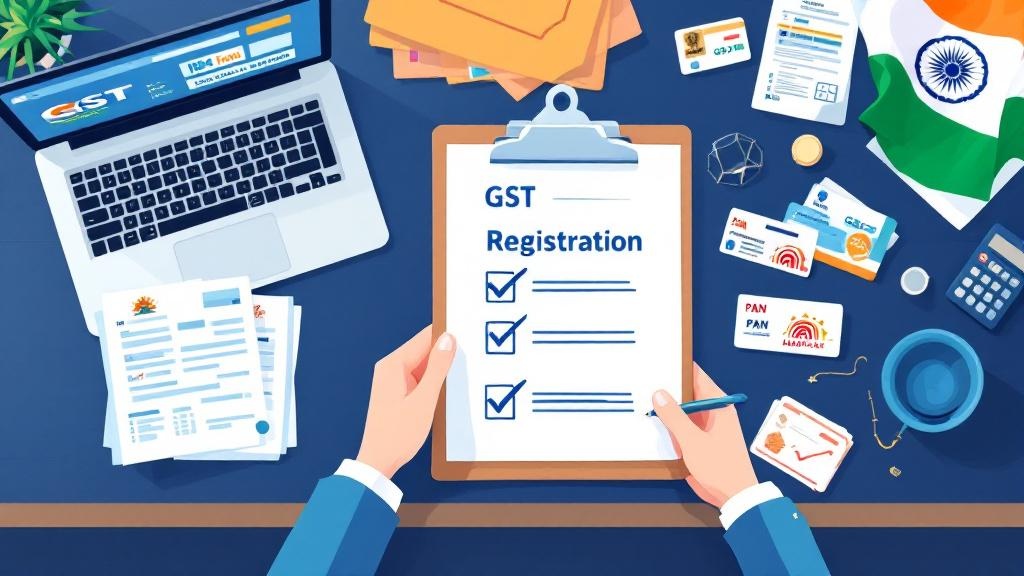Starting a new business is exciting, but it also comes with its fair share of complexities. One of the most important aspects for any new business owner in India is understanding the Goods and Services Tax (GST). Whether you’re setting up a retail shop, offering services, or venturing into e-commerce, understanding GST registration is crucial.
In this blog post, we’ll guide you through the eligibility criteria for GST registration for new businesses. By the end of this article, you’ll have a clearer understanding of when and why you need to register your business for GST, and how FinTax24 can assist you in the process.
What is GST?
Before diving into the eligibility criteria, it’s important to understand GST. The Goods and Services Tax (GST) is a single tax on the supply of goods and services that has replaced multiple indirect taxes in India. It’s a value-added tax levied at each stage of the supply chain, which can be claimed back as credit by businesses.
Whether you’re selling products, offering services, or both, GST impacts nearly every business. For businesses above a certain revenue threshold, GST registration becomes a legal requirement. If you fail to register, you might face penalties or miss out on certain business benefits, such as claiming input tax credit.
Why is GST Registration Important for New Businesses?
Before we dive into the specifics of eligibility, let’s quickly cover why GST registration is vital for any new business:
-
Legal Requirement: If your business exceeds a specified turnover limit, GST registration is mandatory.
-
Tax Benefits: It allows businesses to claim tax credits for the tax paid on inputs (raw materials, services, etc.).
-
Business Credibility: Having a GST registration boosts your business’s credibility in the eyes of suppliers, customers, and financial institutions.
-
Interstate Trade: If your business deals with interstate transactions, GST registration is required.
-
Avoid Penalties: Non-compliance with GST laws can lead to hefty fines and penalties.
Now that we know why GST registration is important, let’s dive into who needs to register for GST.
Eligibility Criteria for GST Registration
In India, businesses must meet certain eligibility criteria to apply for GST registration. The criteria can vary based on the type of business, turnover, and nature of the supply. Let’s break down the key factors:
1. Aggregate Turnover
The most common determining factor for GST registration is the aggregate turnover of a business. The government has set a turnover threshold that varies depending on the type of business and location.
-
For businesses involved in goods:
-
If your aggregate turnover exceeds ₹40 Lakhs (₹20 Lakhs for special category states like North Eastern states and hill states), you must register for GST.
-
-
For service-based businesses:
-
The turnover threshold is ₹20 Lakhs (₹10 Lakhs for special category states).
-
2. Nature of Supply
Whether your business is involved in the supply of goods, services, or both, this can affect your eligibility for GST registration. Below are some scenarios that could require you to register:
-
Interstate Supply: If you engage in interstate transactions (selling goods or services across state borders), you must register for GST, regardless of turnover.
-
E-commerce Sellers: Businesses selling through online platforms (e.g., Amazon, Flipkart) are required to register for GST, regardless of their turnover.
-
Casual Taxable Person: If you’re a casual taxable person (someone who occasionally supplies goods or services), GST registration is mandatory.
3. Voluntary Registration
Even if your business doesn’t meet the turnover criteria, you may choose to voluntarily register for GST. This is often the case for businesses that want to avail of input tax credits, improve their brand image, or expand their operations to other states.
4. Business Location
In certain cases, even small businesses may need to register for GST if their operations are in specific geographical locations. For instance, businesses operating in Special Category States or those involved in e-commerce transactions have a lower turnover threshold for mandatory registration.
5. Non-Residents and Foreign Businesses
Non-residents or businesses that supply goods or services in India but are based outside the country are also required to register for GST. The registration is typically temporary (valid for 90 days) but can be extended based on business needs.
How to Apply for GST Registration
If your new business meets any of the above criteria, here’s a simple breakdown of the steps to apply for GST registration:
Step 1: Gather Required Documents
The first step in applying for GST registration is to ensure you have all the necessary documents. These include:
-
PAN card of the business or proprietor
-
Proof of business registration (e.g., certificate of incorporation)
-
Address proof (e.g., utility bills, rent agreement)
-
Bank account details
-
Photograph of the business owner or authorized signatory
Step 2: Create a GST Account
You’ll need to create an account on the GST portal (www.gst.gov.in). From here, you can complete your registration process.
Step 3: Fill out the GST Registration Application (GST REG-01)
The GST registration form will ask for details like:
-
Business details
-
Bank account details
-
Business address
Step 4: Submit Documents
After completing the application, upload the required documents. If all details are correct, your application will be processed.
Step 5: GST Registration Number
Upon approval, you will receive your GSTIN (GST Identification Number), which must be displayed on your invoices.
It’s important to remember that this process can sometimes be complex, and any mistake could delay your registration. At FinTax24, we can help streamline the registration process and ensure you meet all the necessary requirements.
When is GST Registration Not Required?
While many businesses are required to register for GST, there are a few exceptions. Your business may not need GST registration if:
-
Your business’s turnover is below the specified threshold.
-
You deal only in exempted goods and services (e.g., healthcare, education, etc.).
-
You are involved in agricultural activities.
-
Your business is a small-scale supplier offering goods or services below the exemption limit.
However, even if you’re exempt, registering for GST voluntarily can open up several advantages, especially for businesses planning to grow.
Common Mistakes to Avoid During GST Registration
-
Not Keeping Track of Turnover: Make sure to regularly track your turnover to ensure you stay within the threshold limit or know when you need to register.
-
Wrong Information: Be meticulous when entering business details and submitting documents. A mistake can delay the process or cause rejection.
-
Not Updating GST Information: If there are any changes in your business operations or contact details, ensure you update your GST records accordingly.
Conclusion
GST registration is an essential step for any new business looking to operate legally and efficiently in India. It offers numerous benefits, including the ability to claim input tax credits, conduct interstate transactions, and enhance your business’s credibility.
At FinTax24, we provide expert support for GST registration, ensuring that your business is compliant with all regulations. If you’re unsure about your eligibility or need assistance with the registration process, feel free to visit our GST Services page.
By understanding the eligibility criteria and requirements for GST registration, you’ll be better prepared to manage your business taxes and avoid any penalties. With proper planning and the right support, your new business can thrive under India’s GST framework.
FAQs About GST Registration for New Businesses
1. Can I register for GST voluntarily if my turnover is less than the threshold?
Yes, businesses with turnover below the threshold limit can voluntarily opt for GST registration. This can help you claim input tax credit and gain credibility.
2. Is GST registration necessary for small businesses?
It depends on your turnover. However, if you plan to expand or sell online, GST registration might be beneficial even if your turnover is below the limit.
3. What is the cost of GST registration?
GST registration is generally free. However, professional services may charge a fee for handling your application.
With the right understanding and expert support, navigating the GST registration process will be a breeze for your new business.







Comments (0)